- Clone
- G025H7 (See other available formats)
- Regulatory Status
- RUO
- Other Names
- CXCR3, G protein-coupled receptor 9 (GPR9), CKR-L2
- Isotype
- Mouse IgG1, κ
- Barcode Sequence
- GCGATGGTAGATTAT
- Ave. Rating
- Submit a Review
| Cat # | Size | Price | Quantity Check Availability | Save | ||
|---|---|---|---|---|---|---|
| 353757 | 10 µg | 369 CHF | ||||
Human CXCR3, also known as GPR9, is a chemokine receptor that binds CXCL9, CXCL10, and CXCL11. It is a 38 kD seven-pass transmembrane receptor coupled to G-protein. CXCR3 is highly expressed by T cells (Th1), natural killer cells (NK cells), dendritic cells, mast cells, alveolar macrophages, eosinophils, and human airway epithelial cells. CXCR3 is important for effector lymphocyte recruitment into inflamed tissue in various inflammatory and autoimmune diseases, such as chronically inflamed liver, Crohn's disease, rheumatoid arthritis, multiple sclerosis, and inflammatory skin diseases.
Product DetailsProduct Details
- Verified Reactivity
- Human, Cynomolgus, Rhesus
- Reported Reactivity
- African Green, Baboon
- Antibody Type
- Monoclonal
- Host Species
- Mouse
- Immunogen
- Human CXCR3 transfectants
- Formulation
- Phosphate-buffered solution, pH 7.2, containing 0.09% sodium azide and EDTA
- Preparation
- The antibody was purified by chromatography and conjugated with TotalSeq™-D oligomer under optimal conditions.
- Concentration
- 0.5 mg/mL
- Storage & Handling
- The antibody solution should be stored undiluted between 2°C and 8°C. Do not freeze.
- Application
-
PG - Quality tested
- Recommended Usage
-
Each lot of this antibody is quality control tested by immunofluorescent staining with flow cytometric analysis and the oligomer sequence is confirmed by sequencing. TotalSeq™-D antibodies are compatible with Mission Bio’s Tapestri Single-Cell Sequencing Platform for simultaneous detection of DNA and Protein.
To maximize performance, it is strongly recommended that the reagent be titrated for each application, and that you centrifuge the antibody dilution before adding to the cells at 14,000xg at 2 - 8°C for 10 minutes. Carefully pipette out the liquid avoiding the bottom of the tube and add to the cell suspension. For Proteogenomics analysis, the suggested starting amount of this reagent for titration is ≤ 1.0 µg per million cells in 100 µL volume. Refer to the corresponding TotalSeq™ protocol for specific staining instructions.
Buyer is solely responsible for determining whether Buyer has all intellectual property rights that are necessary for Buyer's intended uses of the BioLegend TotalSeq™ products. For example, for any technology platform Buyer uses with TotalSeq™, it is Buyer's sole responsibility to determine whether it has all necessary third party intellectual property rights to use that platform and TotalSeq™ with that platform. - Additional Product Notes
-
TotalSeq™-D reagents are designed to profile protein expression at single cell level. The Mission Bio Tapestri platform and sequencer (e.g. Illumina analyzers) are required. Please contact technical support for more information, or visit biolegend.com/totalseq/single-cell-dna
The barcode flanking sequences are CGAGATGACTACGCTACTCATGG (PCR handle), and GAGCCGATCTAGTATCTCAGT*C*G (capture sequence). * indicates a phosphorothioated bond, to prevent nuclease degradation.
View more applications data for this product in our Application Technical Notes. - RRID
-
AB_2894580 (BioLegend Cat. No. 353757)
Antigen Details
- Structure
- CXC-chemokine receptor, G protein-coupled receptor, seven-pass transmembrane receptor
- Distribution
-
T cell subset, NK cells, plasmacytoid dendritic cells, GM-CSF activated CD34+ hematopoietic progenitors, mast cells, alveolar macrophages, eosinophils, and airway epithelial cells
- Function
- Essential in T cell recruitment to sites of inflammation
- Ligand/Receptor
- CXCL9, CXCL10, and CXCL11
- Cell Type
- Dendritic cells, Eosinophils, Epithelial cells, Hematopoietic stem and progenitors, Macrophages, Mast cells, NK cells, T cells, Tregs
- Biology Area
- Cell Biology, Immunology, Neuroinflammation, Neuroscience
- Molecular Family
- CD Molecules, Cytokine/Chemokine Receptors, GPCR
- Antigen References
-
1. Loetscher M, et al. 1996. J. Exp. Med. 184:963.
2. Cole KE, et al. 1998. J. Exp. Med. 187:2009.
3. Aksoy MO, et al. 2006. Am. J. Physiol. Lung Cell Mol. Physiol. 290:L909.
4. Curbishley SM, et al. 2005. Am. J. Pathol. 167:887.
5. Turner JE, et al. 2007. Mini. Rev. Med. Chem. 7:1089.
6. Wenzel J, et al. 2008. J. Invest. Dermatol. 128:67. - Gene ID
- 2833 View all products for this Gene ID
- UniProt
- View information about CD183 on UniProt.org
Related FAQs
- Does staining at room temperature or even at 37°C help for checking chemokine receptors expression?
-
Due to continuous recycling of many chemokine receptors, it may be worthwhile to consider staining at room temperature or at 37°C if the staining at lower temperature (which can potentially reduce receptor turnover) is not optimal.
Other Formats
View All CD183 Reagents Request Custom ConjugationCompare Data Across All Formats
This data display is provided for general comparisons between formats.
Your actual data may vary due to variations in samples, target cells, instruments and their settings, staining conditions, and other factors.
If you need assistance with selecting the best format contact our expert technical support team.
-
Purified anti-human CD183 (CXCR3)
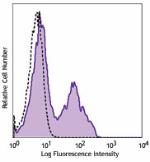
Human peripheral lymphocytes were stained with purified anti... -
APC/Cyanine7 anti-human CD183 (CXCR3)

Human peripheral blood lymphocytes were stained with CD3 FIT... -
FITC anti-human CD183 (CXCR3)
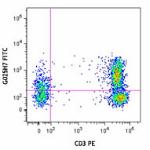
Human peripheral lymphocytes were stained with CD3 PE and CX... 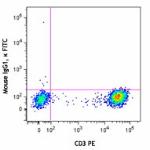
-
PE anti-human CD183 (CXCR3)
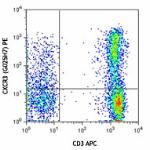
Human peripheral blood lymphocytes were stained with CD3 APC... 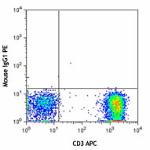
-
APC anti-human CD183 (CXCR3)
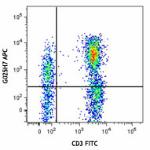
Human peripheral lymphocytes were stained with CD3 FITC and ... 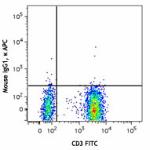
-
Alexa Fluor® 488 anti-human CD183 (CXCR3)
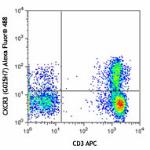
Human peripheral blood lymphocytes were stained with CD3 APC... 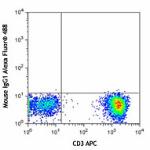
-
Alexa Fluor® 647 anti-human CD183 (CXCR3)
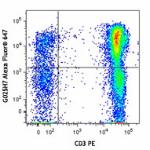
Human peripheral blood lymphocytes were stained with CD3 PE ... 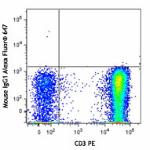
-
PerCP/Cyanine5.5 anti-human CD183 (CXCR3)

Human peripheral lymphocytes were stained with CD3 APC and C... -
Brilliant Violet 421™ anti-human CD183 (CXCR3)
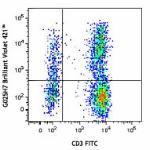
Human peripheral blood lymphocytes were stained with CD3 FIT... 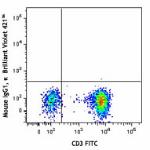
-
PE/Cyanine7 anti-human CD183 (CXCR3)

Human peripheral lymphocytes were stained with CD3 FITC and ... -
Pacific Blue™ anti-human CD183 (CXCR3)
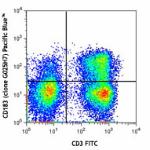
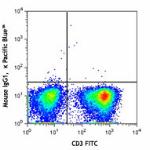
-
Brilliant Violet 510™ anti-human CD183 (CXCR3)
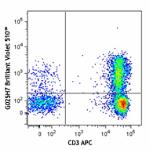
Human peripheral blood lymphocytes were stained with CD3 APC... 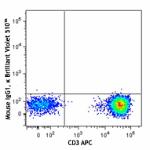
-
Brilliant Violet 605™ anti-human CD183 (CXCR3)
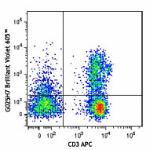
Human peripheral blood lymphocytes were stained with CD3 APC... 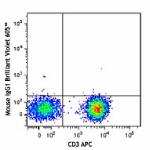
-
Brilliant Violet 650™ anti-human CD183 (CXCR3)
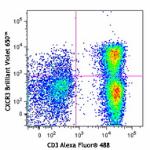
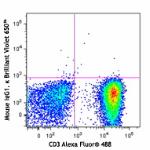
-
Brilliant Violet 711™ anti-human CD183 (CXCR3)
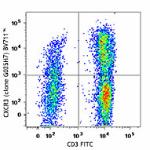
Human peripheral blood lymphocytes were stained with CD3 FIT... 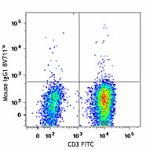
-
Purified anti-human CD183 (CXCR3) (Maxpar® Ready)
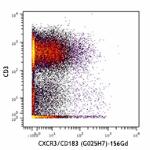
Human PBMCs stained with 170Er-anti-CD3 (UCHT1) and 156Gd-an... -
PE/Dazzle™ 594 anti-human CD183 (CXCR3)
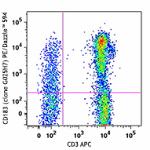
Human peripheral blood lymphocytes were stained with CD3 APC... 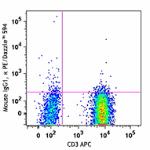
-
PerCP anti-human CD183 (CXCR3)
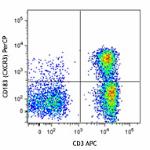
Human peripheral blood lymphocytes were stained with CD3 APC... 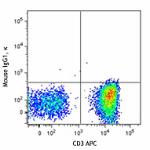
-
Brilliant Violet 785™ anti-human CD183 (CXCR3)

Human peripheral blood lymphocytes were stained with CD3 Per... -
Alexa Fluor® 700 anti-human CD183 (CXCR3)
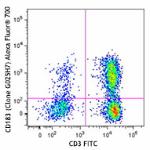
Human peripheral blood lymphocytes were stained with CD3 FIT... 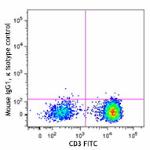
-
Biotin anti-human CD183 (CXCR3)
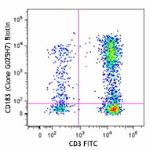
Human peripheral blood lymphocytes were stained with CD3 FIT... 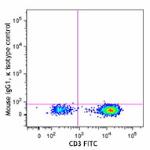
-
TotalSeq™-A0140 anti-human CD183 (CXCR3)
-
TotalSeq™-C0140 anti-human CD183 (CXCR3)
-
Ultra-LEAF™ Purified anti-human CD183 (CXCR3)

Anti-human CXCR3 (G025H7) blocks the chemotaxis of Baf3-hCXC... 
Human peripheral lymphocytes were stained with purified anti... -
TotalSeq™-B0140 anti-human CD183 (CXCR3)
-
APC/Fire™ 750 anti-human CD183 (CXCR3)

Human peripheral blood lymphocytes were stained with anti-hu... -
TotalSeq™-D0140 anti-human CD183 (CXCR3)
-
PE/Fire™ 810 anti-human CD183 (CXCR3) Antibody

Human peripheral blood lymphocytes were stained with anti-hu... -
APC/Fire™ 810 anti-human CD183 (CXCR3) Antibody

Human peripheral blood lymphocytes were stained with anti-hu... -
PE/Cyanine5 anti-human CD183 (CXCR3) Antibody

Human peripheral blood lymphocytes were stained with CD3 FIT... -
PE/Fire™ 640 anti-human CD183 (CXCR3)

Human peripheral lymphocytes were stained with anti-human C... -
PerCP/Fire™ 780 anti-human CD183 (CXCR3)

Human peripheral blood lymphocytes were stained with anti-hu... -
Spark Red™ 718 anti-human CD183 (CXCR3) (Flexi-Fluor™)
-
PE/Fire™ 700 anti-human CD183 (CXCR3)

Human peripheral blood lymphocytes were stained with anti-hu... -
PerCP/Fire™ 806 anti-human CD183 (CXCR3)

Human peripheral blood lymphocytes were stained with anti-hu... -
PE anti-human CD183

Typical results from human peripheral blood lymphocytes stai...

 Login / Register
Login / Register 

















Follow Us